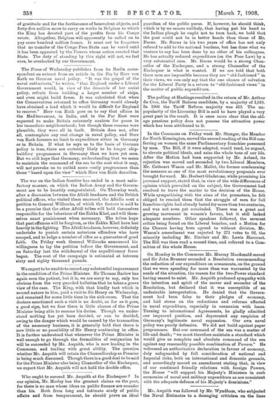We Regret To Be Unable To Record Any Substantial Improvement
in the condition of the Prime Minister. Sir Thomas Barlow has again seen the patient, but it is, we are sorry to say, only too obvious from the very guarded bulletins that he......
The Brussels Correspondent Of The Times Sends News To...
paper of a new development in the negotiations between the Belgian Cabinet and King Leopold as to the annexation of the Congo. On Thursday M. Schollaert laid before the Chamber......
Who Ought To Succeed Mr. Asquith At The Exchequer ?
In our opinion, Mr. Morley has the greatest claims on the post, for there is no man whose ideas on public finance are sounder than his. Both from long and intimate study of......
On Monday In The Commons Mr. Murray Macdonald Moved And
Sir John Brunner seconded a Resolution recommending the reduction of our expenditure on armaments, on the ground that we were spending far more than was warranted by the needs......
In The Commons On Friday Week Mr. Stanger, The Member
for North Kensington, moved the second reading of the Bill con- ferring on women the same Parliamentary franchise possessed by men. The Bill, if it were adopted, would tend, he......
The Times Of Wednesday Publishes From Its Berlin Corre-...
an extract from an article in the Tag by Herr von Rath on German naval policy. " It was the gospel of the naval enthusiasts," he writes, " that England under a Liberal......
The Polling At Hastings Resulted In The Return Of Mr.
Arthur du Cros, the Tariff Reform candidate, by a majority of 1,018. In 1906 the Tariff Reform majority was 413. The un- popularity of the Licensing Bill is said to have played......
The War On The Indian Frontier Has Ended In A
most satis- factory manner, on which the Indian Army and the Govern- ment are to be heartily congratulated. On Thursday week, after a discussion between the Afridi headmen and......
Mr. Asquith Was Followed By Mr. Wyndham, Who Subjected The
Naval Estimates to a damaging criticism on the lines* developed in Mr. H. W. Wilson's letter to the Times. He welcomed Mr. Asquith's acceptance of the two-Power standard, but......














































 Previous page
Previous page